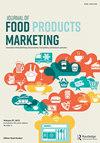The Role of Emotions in Food-Related Decision-Making: A Choice-Based Conjoint Analysis of Yogurt Preferences
IF 2.4
Q2 BUSINESS
引用次数: 0
Abstract
ABSTRACT A strong link between emotions and eating behavior has been previously found, however there is a lack of research investigating how emotions influence food product choice in a retail setting. An online questionnaire including a choice-based conjoint analysis and self-reported consumer emotions was used to assess the importance of different product attributes to yogurt consumers in Germany in 2021. The analysis consisted of a Hierarchical Bayes approach and a cluster analysis. The results revealed that yogurt consumers placed most importance on ingredients, followed by price, Nutri-Score, flavour, and finally production method. Based on the self-reported consumer emotions, a positive, a rather positive and an indifferent emotion cluster was found. The positive cluster preferred the highest quality in terms of ecological and health values and was willing to pay more for such a yogurt. The rather positive cluster preferred these options as well, however was not always willing to pay more for them. The indifferent cluster was more driven by lower prices and was more willing to trade other qualities for the cheapest option. These findings are insightful for food marketing and health interventions as shopping experience, as well as product choice could be enhanced through emotion induction.情绪在食物相关决策中的作用:基于选择的酸奶偏好联合分析
情绪和饮食行为之间的紧密联系已经被发现,但是缺乏关于情绪如何影响零售环境中食品选择的研究。采用一份在线问卷,包括基于选择的联合分析和自我报告的消费者情绪,以评估2021年德国酸奶消费者对不同产品属性的重要性。分析包括层次贝叶斯方法和聚类分析。结果显示,酸奶消费者最重视的是成分,其次是价格、营养评分、风味,最后是生产方法。在消费者自述情绪的基础上,发现了积极、相当积极和冷漠的情绪集群。积极的群体在生态和健康价值方面更喜欢最高质量的酸奶,并愿意为这样的酸奶支付更多的钱。相对积极的群体也更喜欢这些选择,但并不总是愿意为此付出更多。冷漠的群体更多地受到较低价格的驱动,更愿意用其他品质来换取最便宜的选择。这些发现对食品营销和健康干预具有深刻的启示,因为购物体验以及产品选择可以通过情绪诱导来增强。
本文章由计算机程序翻译,如有差异,请以英文原文为准。
求助全文
约1分钟内获得全文
求助全文
来源期刊

Journal of Food Products Marketing
BUSINESS-
CiteScore
5.70
自引率
6.90%
发文量
17
期刊介绍:
From food promotion and advertising through new food product development and consumer behavior research, the Journal of Food Products Marketing provides timely, practical articles that keep food marketers on the cutting edge of their profession. The journal includes refereed research studies as well as opinions, guidelines, and speeches by practitioners that contribute to the better practice and understanding of food marketing. The journal provides a single forum for both food marketing academicians and food marketing practitioners.
 求助内容:
求助内容: 应助结果提醒方式:
应助结果提醒方式:


